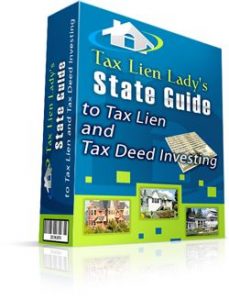 This is another article that I wrote a few years ago that has information that is very much needed today. I thought that I should publish this article again because I frequently get people that e-mail me after they’ve already gone to a tax sale and purchased a lien or deed on a property that hadn’t done proper due diligence on. Sometimes they luck out anyway, but often they get burnt. I want to keep you from making the mistakes that could cost you your investment or at least prevent you from making a profit. So please read this article and don’t buy tax lien certificates unless you’ve done your homework!
This is another article that I wrote a few years ago that has information that is very much needed today. I thought that I should publish this article again because I frequently get people that e-mail me after they’ve already gone to a tax sale and purchased a lien or deed on a property that hadn’t done proper due diligence on. Sometimes they luck out anyway, but often they get burnt. I want to keep you from making the mistakes that could cost you your investment or at least prevent you from making a profit. So please read this article and don’t buy tax lien certificates unless you’ve done your homework!
I went to a tax sale yesterday in an out of the way rural municipality in New Jersey. Unlike most of the tax sales in New Jersey this sale was poorly attended. New Jersey is a very competitive state for tax lien investing so this was an uncommon event.
Most serious bidders arrive an hour before the sale starts. At first, I was pleased to see, with less than an hour to go before the sale, that there was only one other bidder there. Then I did my research on the properties that were left in the sale and I discovered why other investors didn’t bother with this sale. Out of the thirteen properties that were left in the sale, there was only one decent property. All of the other properties were vacant land and when I looked on the tax maps and checked with the zoning department (this is why I arrive at the sale an hour early) I found out that none of these properties were build-able lots. Most of them were land locked and none of them were large enough to build on, even though one parcel was a three-acre lot.
Since the other bidder there was a professional bidding for an institutional investor, I decided not to bid on any of the properties in the sale. I knew that if I bid on the one property that had a house on it, the professional bidder would bid high premium for it, so I decided not to bid him down and not to bid on any of the other properties since they wouldn?t be profitable. I stayed around to see what would happen at the sale.
About fifteen minutes before the sale three other bidders arrived. These investors were new to tax lien sales and did not really know anything about them. They asked the tax collector a few questions before the sale and indicated that they really weren’t there to bid but intended to watch since this was their first sale. When the sale began the tax collector let us know which properties had prior liens. Four of the undesirable properties had prior liens. I was not surprised and this just confirmed my suspicions that these properties were not worth bidding on. If they were, then the prior lien holder would have been there to bid on them, or would have paid the subsequent taxes and prevented them from being included in the tax sale.
The tax collector announced the first property, and seeing that no one was bidding on it, one of the inexperienced bidders could not resist. He bid 18% and was awarded the lien (this was the 3 acre landlocked and undersized lot – you need 5 acres to build here). The next three properties were struck off to the township at 18%. The next property was the only one with a house on it and that went to the institutional buyer at 18%. There were eight properties left. Another one went to the township. The temptation to bid and get a get a lien at 18% was too great for the other two new investors; they bought three liens each, each one at 18% interest. Fortunately for them, they were very small liens.
After the sale, I explained to them that they should check the zoning on properties before they bid on them. The tax collector does not tell you before the property is sold if it is unusable property and that is why the owner did not pay the tax. The tax collector only has to convey that industrial properties may be subject to the Environmental Clean Up Act, the Spill Compensation and Control Act, or the Water Pollution Control Act. And this is usually done in fine print, on the notice of the sale and the bidder information sheet.
When it come to buying tax liens, and this goes for other states as well as New Jersey, it’s “buyer beware.” As the investor, it is your responsibility to make sure that the property that you are purchasing a tax lien certificate on is a valuable piece of property. Even in states like New Jersey, where real estate is at a premium and has increased in value tremendously over the last five years, there are still tax parcels that are worthless. In many areas of the state, municipalities have been steadily increasing the zoning requirements for all types of properties. In many rural areas you need a few acres in order to build a house.
I know that many of you are under the false assumption that if you are a holder of a tax lien certificate; you are guaranteed to get paid. This is not true; it is a misrepresentation that is fostered by real estate infomercials and high priced seminars. The truth is that no one guarantees that you will be paid. You are first in line to get paid, but there are circumstances in which you might not get paid. You do have the right to foreclose on the property if you don’t get paid within the redemption period, but what if the property is worthless? Than you have a worthless piece of property that you have to pay taxes on.




By Bill May 21, 2012 - 2:22 pm
Joanne,
Will your tax lien survive a mortgage foeclosure in N.J.?
By Joanne May 22, 2012 - 8:01 am
Hi Bill,
In order to foreclose on a property that has a tax lien the mortgage company would have to pay the tax lien. The tax lien would have to be satisfied. I’ve foreclosure sales in NJ, where the bank was foreclosing but the tax liens were also listed in the foreclosure, so the the liens had to be paid (redeemed) as well as the mortgage company satisfied or the property doesn’t sell in the foreclosure sale.
If by some oversite the bank was able to foreclose without satifying the lien, the lien holder could then foreclose on the property when the redemption period is over – no matter if it went back to the bank or someone purchased the property at the foreclosure sale.
By Darren April 16, 2012 - 4:42 pm
Thank you for your answer to my question. That makes a lot of sense.
By Darren April 15, 2012 - 3:57 pm
Joanne
In your reply to Boris’s questions you mention that: “I actually like the less desirable properties – as long as they are buildable or have a mortgage on them”. Why would you want to invest in a property that has a mortgage. Sorry, Im new to Tax Liens and Im just trying to grasp the whole concept.
By Joanne April 15, 2012 - 10:37 pm
Hi Borris,
First of all you need to realize that very very seldom do you get to foreclose on a tax lien property and the reason why investors buy tax liens as opposed to tax deeds or redeemable tax deeds is to get the high return on their money – not the property. If a property has a mortgage on it you have a better chance of getting paid without having to go through foreclosure. What happens most of the time when you start foreclosure with tax liens is that they redeem sometime during the process and depending on what state your investing in, you may not get all that money back that you pay to an attorney to foreclose the right of redemption. If there is a mortgage on the property the mortgage company is likely to pay you off as soon as they get notice that you are going to foreclose. I usually send a pre-foreclosure letter – lawyers call this a dunning letter – to the owner and all lien holders. Once the mortgage company gets this letter they usually redeem and that saves me the trouble of paying a lawyer to start the foreclosure process.
Also even if you do get to foreclose – foreclosures are taking much longer than they used to, so it’s better to get your money out with interest than have to wait what could be 5 years in some states to foreclose on the property.
By Joanne February 4, 2012 - 1:32 pm
Hi Boris,
In New Jersey at some of the smaller tax sales, buyers are not issue bidder numbers but simply call out their name when they are the lowest bidder on a property. So the bidders for the institutional buyers will call out the name of the entity that they are bidding for. As for your second question – the only way that you can avoid getting outbid on good properties is to avoid the competition. I go to tax sales in rural out of the way places and bid on small liens and land, I do not bid on the nice houses that everyone else – including the institutional buyers want. I actually like the less desirable properties – as long as they are buildable or have a mortgage on them. I don’t like the nice looking houses as they are likely to redeem sooner.
By Boris February 3, 2012 - 7:00 pm
Joanne,
I find your blog to be very informative and well put together. You mentioned that when you realized the investor bidding on a property was an institutional investor, you chose not to bid him down because ultimately he would outbid you do to his deep pockets. Question 1, how did you know he represented a larger institution? Question 2, I assume most properties at these auctions are residential – you mentioned that one of the locations professional investor bid on had a house on it (which is a good property to bid on). How can you avoid getting out bid by a professional investor if you want to land a cert for a good property? Seems like they leave the less desirable properties to us individual investors…